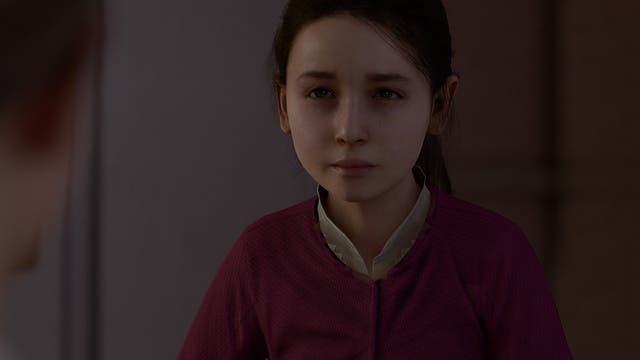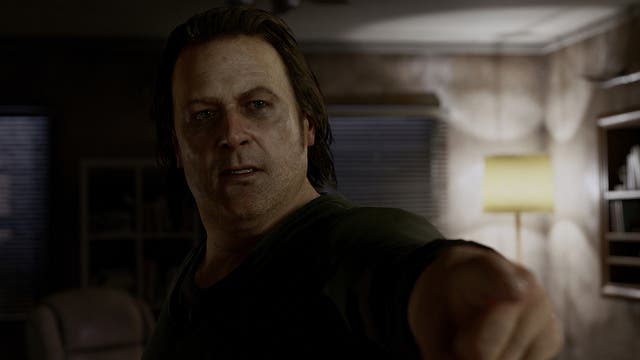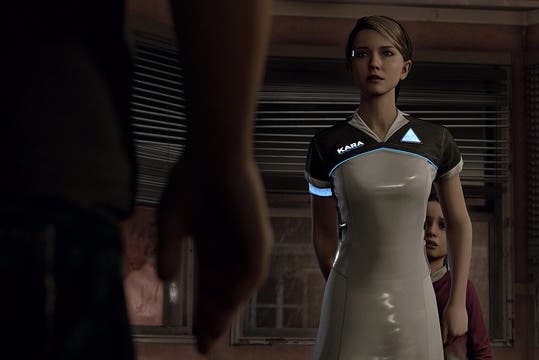David Cage on Detroit and its depiction of domestic violence
"Would you ask this question to a film director, or to a writer? Would you?"
David Cage is no stranger to controversy. Through the 20 years of Quantic Dream's existence - an anniversary celebrated after last night's PlayStation showcase that kicked off Paris Games Week - the French studio has always made games that push at various boundaries. The trailer for Detroit: Become Human, Quantic Dream's forthcoming PlayStation 4 game that explores the moral implications of the rise of artificial intelligence, was perhaps the developer's most controversial yet - a short, often brutal look at a chapter of protagonist Kara's story in which scenes of domestic abuse and child abuse feature heavily.
It made for uncomfortable viewing, and having seen the scene play out in full - and through different permutations, illustrating the branching paths of Detroit: Become Human - I can't say I felt any more comfortable with it, especially when it's complemented by the sight of producer Guillaume de Fondaumière dramatically gesticulating with the controller as he plays through. Are such issues fair game for video games? And, perhaps more pertinently, is Detroit: Become Human exploring them responsibly? It's a topic which will prove divisive, so I wanted to talk through it with Cage himself.
Have you had a chance to see some of the feedback to yesterday's trailer?
David Cage: No.
It's been mixed, I think it's fair to say. Some people have applauded it for going where it went, some are saying it's a bit too brutal and a bit too much. What's your take on that?
David Cage: What's my take on that? I try to tell a story that matters to me, that I find moving, interesting and exciting and my role as a creator is to maybe deliver something that people don't expect. Would I be doing my job as a creator if I was making the game you want me to make? I don't think so - I'm creating something that I find moving and meaningful. And I think people should see the scene, play the game and see it in context to really understand it. The rule I give myself is to never glorify violence, to never do anything gratuitous. It has to have a purpose, have a meaning, and create something that is hopefully meaningful for people.
Domestic abuse and child abuse is quite extreme as these things go.
David Cage: Let me ask you this question. Would you ask this question to a film director, or to a writer? Would you?
Yes.
David Cage: You would ask the same question?
Yes. I'd ask the same question. Why is it interesting to you? Why did you want to explore domestic abuse and child abuse?
David Cage: Why did I want to do this? For me it's a very strong and moving scene, and I was interested to put the player in the position of this woman. I chose her point of view. If I'd have chosen the point of view of the man it could have been a totally different story and with totally different emotions, but in this case I chose her point of view. There's a context in the story, there's a reason for that - where she comes from and where she's going to go. What's important to me, and what's important in Detroit is to say that a game is as legitimate as a film or a book or a play to explore any topic such as domestic abuse.
I'm not disputing that at all. The concern I have is that it's using something like domestic abuse and child abuse - which is a very real issue for unfortunately far too many people - and using it as window dressing rather than exploring the ramifications of those issues.
David Cage: There will always be people thinking that we've used this... But I don't think that's what we do. If you look really into the game and if you play it you'll understand that the game is not about domestic abuse. It's a part of Kara's story - she's not a victim and she has a beautiful story. Hopefully you will be moved by what happens.

So why did you choose to use domestic abuse to illustrate these points?
David Cage: You don't choose to talk about domestic abuse. It's not like I was like 'oh, let's write a scene about domestic abuse'. It's not how it works. When you're a writer you talk about things that move you, that you feel really deep inside you that's something that moves you, and you hope it'll move people too. You know there are two ways you can do this - 'oh let's do something cool and let's have someone beaten by a man', that's one way of doing things, because people are going to write about it and it's going to sell my game. That's one way of doing it.
The other way is to say I'm working on something important, something meaningful and something moving. There's a meaning behind it, there's a strong story I need to tell - it goes through dark moments, but I think the story I have to tell it as it's something important for me. And I think when you do this, you do your work as an author, you do your work as a writer. You go into dark places, in order to create something positive about it. It's never a conscious decision to say let's talk about something cool and violence - no, I want to talk about something moving and meaningful, that's my job as a writer. I'm the first judge, and I hope that people will feel the same.
I was in the demo just then, and there's motion control in this - you're shaking the controller to prevent the abuse, which didn't seem appropriate to me in a scene as powerful as that.
David Cage: For 20 years we play with control in a quite different way to people in the industry because we work on what we call the sense of mimicry - it's about making you feel with your computer what your character feels onscreen. It can lead to some strange things - like feeling awkward because you're trying to press many buttons at the same time. But if your character feels awkward on screen in the same way, it creates a link. We're really working with this sense of mimicry - we play with this when you try and push something.

Finally - I know I need to wrap up - is nothing off-limits as far as you're concerned as a writer?
David Cage: Off-limits? What is off-limits is what goes beyond the values I believe in. There are things I'd never do. I'd never do a racist game, or a misogynist game. These are the limits. When you feel okay with the content and the meaning when you know you have nothing to be ashamed of because it's fair and it tells the right story and because it's moving. There are no limits.
There's been these discussion in literature for years and years and years - one of the most famous poets was called Baudelaire, this guy was sued because he was talking about things he should be ashamed of. Today he's one of the most famous poets in French literature. I think it's normal that we have this conversation in games now. It's part of the process.
There was a lot of people going over the limits for bad reasons or no reason - which is even worse - but this medium shouldn't condemn people trying to explore these aspects, as long as they're honest and sincere and have an honest attitude towards it. I don't think we should point our fingers towards them and say you shouldn't do this because you're a game maker. This is who you are. So stay at your place. You're not a filmmaker, you're not a book writer, you're just a game maker so shut up. No, I don't think that'd be fair.
Games are a medium like anything - it's more than a medium for me, I've been saying the same thing for 20 years, it's an art form, and an art form should be free to express different things, including strong and dark emotions as long as it's done in a fair, honest and sincere way. That's what I hope I'm doing with Detroit - and believe me, we ask ourselves these questions every morning. We take it very seriously as we feel like we have a responsibility.










